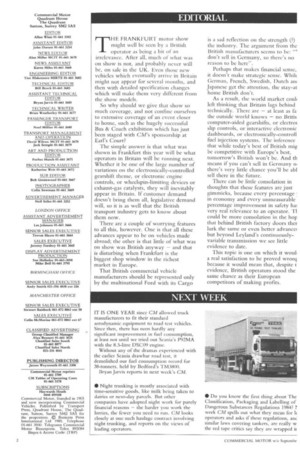EDITORIAL
Page 4

If you've noticed an error in this article please click here to report it so we can fix it.
THE FRANKFURT motor show might well be seen by a British operator as being a bit of an irrelevance. After all, much of what was on show is not, and probably never will be, on sale in the UK. Even those new vehicles which eventually arrive in Britain might not appear for several months, and then with detailed specification changes which will make them very different from the show models.
So why should we give that show so much coverage, and not confine ourselves to extensive coverage of an event closer to home, such as the hugely successful Bus & Coach exhibition which has just been staged with CA1's sponsorship at Earl's Court?
The simple answer is that what was shown in Frankfurt this year will be what operators in Britain will be running next. Whether it be one of the large number of variations on the electronically-controlled gearshift theme, or electronic engine controls, or wheelspin-limiting devices or exhaust-gas catalysts, they will inevitably appear in Britain. if customer demand doesn't bring them all, legislative demand will, so it is as well that the British transport industry gets to know about them now.
There are a couple of worrying features to all this, however. One is that all these advances appear to be on vehicles made abroad; the other is that little of what was on show was British anyway — and that is disturbing when Frankfurt is the biggest shop window in the richest market in Europe.
That British commercial vehicle manufacturers should be represented only by the multinational Ford with its Cargo is a sad reflection on the strength (?) the industry. The argument from the British manufacturers seems to be: "' don't sell in Germany, so there's no reason to be here-.
Perhaps that makes financial sense, it doesn't make strategic sense. Whilc German, French, Swedish, Dutch ant Japanese get the attention, the stay-at home British don't.
As a result, the world market couli left thinking that Britain lags behind technically. There are — at least as fa. the outside world knows — no Britis computer-aided gearshifts, or electroi slip controls, or interactive electronic dashboards, or electronically-controll fuel injection systems. Thc inference that while today's best of British mig be competitive with Europe's best, tomorrow's British won't be. And th means if you can't sell in Germany n, there's very little chance you'll be abl sell there in the future.
There can be little consolation in thoughts that these features arc just gimmicks, because every percentage in economy and every unmeasurable percentage improvement in safety ha: very real relevance to an operator. 1'1 could be more consolation in the hop that behind British factory doors ther lurk the same or even better advancc! but beyond Leyland's continuouslyvariable transmission we see little evidence to date.
This topic is one on which it woul, a real satisfaction to be proved wrcinE because it would mean that, despite t evidence, British operators stood the same chance as their European competitors of making profits.




































































































